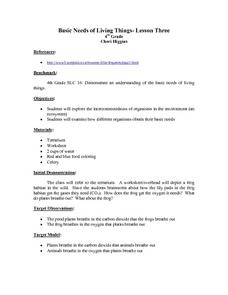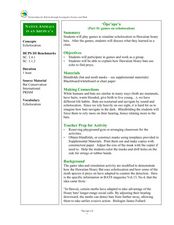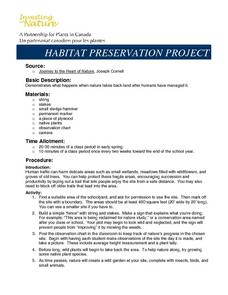Curated OER
Basic Needs of Living Things - Lesson Two
Fourth graders study and identify the basic needs of a variety of organisms. Terrariums and aquariums are used to demonstrate what plants, animals, and fish need to stay alive. These two classic models are used to effectively convey what...
Curated OER
Habitat Basics
First graders get out and explore two different habitats to examine how each one meets the needs of the plants and animals that dwell there. They discuss what they've learned about animal habitats as they explore the outdoor environment....
Curated OER
Basic Needs of Living Things-Lesson One
Fourth graders explore the basic needs of living things. They observe a variety of living things and identify the basic needs of each living item. Students create food balls of peanut butter and nuts to feed animals. They hang their food...
Curated OER
Basic Needs of Plants
Fourth graders explore the four basic needs of plants. They examine plants as they grow. Students discuss the changes that they see in the growing plants. They observe what happens to a plant when one of its basic needs is taken away.
Curated OER
Habitat is Home
Students complete a picture to show things found in their homes. In this habitat instructional activity, students discuss and make a class picture of an animal habitat and its four basic needs. Students sing a song. Students create...
Curated OER
Basic Needs of Living Things-Lesson Three
Fourth graders explore the interconnectedness of organisms in the environment and examine how different organisms obtain their basic needs. They discuss a frog's habitat and what is found in it. Students discuss the processes of...
Michigan Sea Grant
Fish Habitat and Humans
Strict habitat requirements are needed for the survival of fish populations and fish variety in the Great Lakes. Young scientists become experts in the basic needs of fish and understand how survival necessities can vary with different...
Curated OER
Cycles and Starting Mealworms
Here is a fascinating lesson about the life cycles of plants and animals, and other cycles found in nature. Learners explore the cycle of the moon, the tides, and other sequences of events in every day life. The big activity is the...
Curated OER
Wonderful Wetlands
Fifth graders describe a wetland habitat and its components. They provide, in writing, at least one example of a wetland food chain, relate wetlands to ecological functions, and relate the importance of wetland functions to their own...
Curated OER
How to Grow a Cactus Indoors
Students plant a cacti. In this desert plants lesson, students identify the needs of a plant and meet those needs by planting and caring for cactus.
Curated OER
What's That Habitat?
Fourth graders explore the environment by researching animal characteristics. In this habitat identification lesson, 4th graders utilize paper and crayons to illustrate their own habitats or homes and discuss what it contains that is...
Curated OER
The Life Cycle of the Mealworm
Fourth graders provide a habitat for live mealworms and observe their life cycle. In this animal life cycle and scientific inquiry lesson plan, 4th graders create a habitat for a live mealworm and observe and record related data as it...
Curated OER
Games on Echolocation
Get a little batty with life science! This fun simulation game replicates how bats use echolocation to hunt moths in their native Hawaiian habitat. After creating blind folds and discussing some basic principles of echolocation, learners...
Curated OER
Threatened, Endangered & Extinct Lesson Plan
Learners examine the basic needs of living organisms. In this science lesson, students study ecosystems and discover that organisms have basic needs that must be met.
Curated OER
Working Worms
Fourth graders examine earthworms. For this earthworm lesson, 4th graders investigate how earthworms help prepare soil for planting. Students examine other living and nonliving elements in a garden habitat.
Curated OER
Animal Habitats
Students explore animal lifestyles by researching their characteristics. In this animal habitat lesson, students read the story Over in the Jungle and analyze the animal illustrations in the book. Students create clay animal characters...
Curated OER
A Home for a Cricket
First graders build a habitat for crickets after studying animal survival needs. They care for and observe the crickets in the classroom habitat.
Curated OER
Prairie In A Bottle
Second graders observe images of prairie ecosystems and discuss the needs of living things. They create a prairie habitat in a closed jar to observe the water cycle and plant growth.
Curated OER
Animals and Engineering
Students study animal classification and their interactions. In this animals and engineering lesson students study animal communities and how engineers use this knowledge to create new technologies.
Curated OER
Animal Habitats
Students study the word habitat and its meaning. They also identify that in order for something to be classified as a habitat there needs to be the proper shelter, food, water, and space.
Curated OER
Ocean Habitats
Young scholars examine the water samples from a demonstration and discuss the difference between fresh and salt water. They draw different animals that live near or in the ocean and how humans can harm the ocean habitat. They draw...
Pennsylvania Department of Education
Animal Classes and Their Ecosystems
Students explore animal characteristics by participating in an environment identification activity. In this animal habitat lesson, students discuss a range of different wild life and the ecosystems that they are a part of. Students view...
Curated OER
Habitat Preservation Project
Students demonstrate what happens when nature takes back land after humans have managed it. They find an area in the schoolyard, and mark it off with a boundary. Students build a simple fence with string and stakes. They put up a sign...
Curated OER
Native Plant Restoration Project
Students distinguish between exotic and native plant species. They work in groups in the field to restore a natural habitat. A class map is created to reflect their work in the field.

























